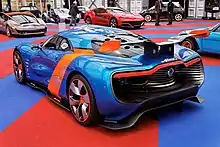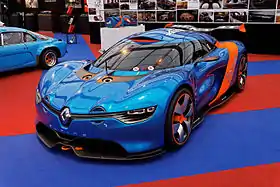Alpine A110-50
The Alpine A110-50 aka "Renault Alpine ZAR" is a concept racing car created by Renault to commemorate the 50th anniversary of the 1962 Alpine A110[1] It debuted at Monaco's GP circuit, where Renault Chief Operating Officer Carlos Tavares raced the A110-50 for four laps of the Monaco track.[2]

| Alpine A110-50/Renault Alpine ZAR | |
|---|---|
 | |
| Overview | |
| Manufacturer | Renault |
| Production | 2012 (Concept car) |
| Designer | Yann Jarsalle |
| Body and chassis | |
| Class | Racing car |
| Body style | 2-door coupe |
| Layout | Rear mid-engine, rear-wheel-drive layout |
| Platform | Sport Mégane Trophy |
| Related | Renault DeZir |
| Powertrain | |
| Engine | 3.5-liter V6 |
| Transmission | 6-speed semi-automatic sequential |
| Dimensions | |
| Curb weight | 1,940 lb (880 kg) |
| Chronology | |
| Predecessor | Alpine A110 |
The Alpine A110-50 has all carbonfibre bodywork, a mid-engine layout, and tubular frame.[3][4] It is built upon the same platform and shares its mechanicals with the Sport Mégane Trophy race car.[1][3][4][5][6] Because the A110-50's height is lower than that of Mégane Trophy, the roll cage and bracing in the engine bay were lowered in the workshop of Tork Engineering.[5] The entire car weighs 1,940 lb (880 kg), and its weight distribution is 47.8 percent front and 52.2 percent rear.[4] With a naturally aspirated 395-hp variation of the Mégane Trophy's 3.5-liter V6 based on the Nissan VQ engine,[4] it has a 456bhp/ton power-to-weight ratio.[3] The inlet manifold is fed by a new roof-mounted air intake which broadens the engine's power band, with additional horsepower at all engine speeds.[5]
A110-50's front splitter and rear diffuser generate ground effect, and account for a third of the car's downforce, while the other two-thirds comes from the rear wing.[3][5] The body can be raised with integrated pneumatic jacks for easier servicing.[4][5] The steering wheel features a color screen and employs the same technology as a Formula Renault 3.5 single-seat race car.[5] The A110-50 has highly adjustable double wishbone suspension with Sachs dampers.[3][5] It utilises a six-speed semi-automatic sequential gearbox, which slots longitudinally behind the engine and incorporates a mechanical limited-slip differential.[3][5]
Designer Yann Jarsalle and Concept and Show Car Director Axel Breun based the A110-50 on the same design language introduced with the DEZIR concept car,[5] but incorporated several design cues from the original A110. These include: half-domed additional headlights with yellow tinted LED lighting; air intakes on each side echo the ducts on the rear wheel arches of the Berlinette; and painting the body in a modern version of the signature Alpine blue.[5][7] The aerodynamic body was designed using a process called computational fluid dynamics.[5] Its relation to the DeZir is clearly seen in its design, excluding the electric motor and butterfly doors.
References
- . Siler, Wes (May 21, 2012). "The Return Of The Renault Alpine". jalopnik. Jalopnik. Retrieved 24 September 2015.
- Philip, Sam (May 25, 2012). "Trackside with the Alpine A 110-50". Top Gear. topgear. Retrieved 24 September 2015.
- DOBIE, STEPHEN (May 25, 2012). "Renault Alpine A110-50 concept official pictures". evo.co.uk. evo. Retrieved 24 September 2015.
- Meiners, Jens (May 29, 2012). "Renault Alpine A110-50 Concept: The Re-Birth of a Legend". Car and Driver. Retrieved 24 September 2015.
- "RENAULT ALPINE A110-50". Renault Sport. Renault. May 25, 2012. Archived from the original on 25 September 2015. Retrieved 24 September 2015.
- Philip, Sam (May 22, 2012). "SCOOPED: Renault's 400bhp sports car". topgear. Top Gear. Retrieved 24 September 2015.
- Siler, Wes. "How This 21st Century Race Car Is Related To The Original Alpine". jalopnik. jalopnik. Retrieved 24 September 2015.
| Wikimedia Commons has media related to Renault Alpine A110-50. |